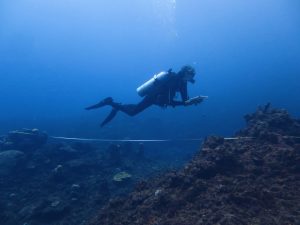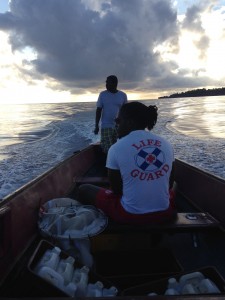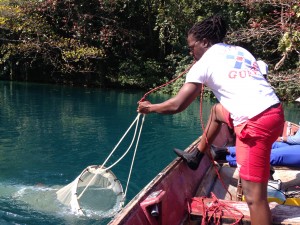Coral Reef Monitoring
In order to assess and monitor the health of the coral reef ecosystems within the Portland area we have established a regular monitoring program. This includes water quality, Global Coral Reef Monitoring Network (GCRMN) protocol. Data collected includes reef fish populations, coral health and recruitment, cover of reef-building organisms and competitors, and macro-invertebrate species. The AHF undertakes surveys of nine sites within the Fish Sanctuary twice per year, since 2016. We aim to assess changes in coral reef health at multiple locations along the coastline and over time determine the impact and effectiveness of new management interventions. As the protocol is regionally standardized the data collected will also support ongoing assessments of coral reef health for the Caribbean region.
Water Quality
Portland is a unique area of Jamaica, and much of its uniqueness is attributed to the high amounts of rainfall relative to the rest of the island. This means large amounts of freshwater entering coastal areas. These large rivers receive various nutrient inputs from agricultural lands, livestock farms and poorly treated sewage. Coastal developments and informal coastal settlements have also contributed to the less-than-pristine coastal water quality observed.
Plankton communities can be used as a useful indicator of coral reef health, and understanding these communities will enable us to better manage reef systems. This research aims to identify appropriate areas that act as effective nurseries, supporting the production of fish eggs and larvae. These ichthyoplankton, zooplankton and phytoplankton, besides being – important indicators of ecosystem replenishment, are useful pollution indicators and should be studies as part of water quality monitoring so as to indicate ecosystem health, or to discover whether an area can support significant numbers of juvenile and adult fish
Water quality is intimately linked to the health of several ecosystems in the marine environment. Nutrient enrichment will change the macroalgal populations on coral reefs, which will impact the establishment of new corals, as well as the health of existing coral colonies. Coupled with overfishing of herbivorous fish such as the parrot fishes, nutrient enrichment of coastal waters can have severe consequences on the health and productivity of coral reefs. Through a comprehensive water quality monitoring program, we aim to provide accurate water quality data on the local area as well as suggestions to mitigate threats, measures to improve and monitoring of changes in the water quality of surrounding areas.



